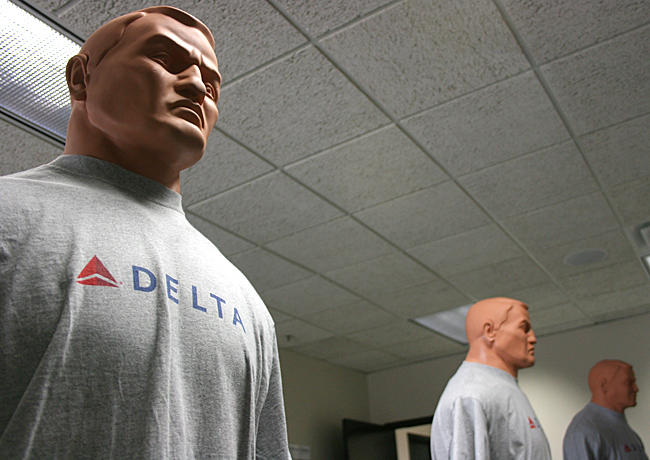No fewer than two senior vice presidents at Delta Air Lines sent memorandums to members of their teams in which they announced that the names of greater than 600 people who were banned from flying as passengers with the airline were submitted to the Federal Aviation Administration of the United States in 2021 as part of its Special Emphasis Enforcement Program — which was first issued on Wednesday, March 17, 2021 — in response to recent incidents which involved unruly passengers.
Should Airlines Share Their No-Fly Lists With Other Airlines?
“At Delta, we now have more than 1,600 people on our ‘no fly’ list,” Kristen Manion Taylor — who is the senior vice president of in-flight service at Delta Air Lines — said, according to this article from Delta News Hub. “We’ve also asked other airlines to share their “no fly” list to further protect airline employees across the industry — something we know is top of mind for employees as well. A list of banned customers doesn’t work as well if that customer can fly with another airline.”
In addition, Eric Phillips — who is the senior vice president of airport customer service and cargo operations at Delta Air Lines — said, “Let me be clear that any unruly customer behavior, and harmful actions against our team members, will not be tolerated. Anytime a customer physically engages with intent to harm, whether in a lobby, at a gate or onboard, they are added to our permanent No Fly list. We also actively engage with local authorities to ensure these incidents are investigated and prosecuted as the law allows. In addition, we actively support any impacted team members and provide them with resources to help them in the aftermath of an incident.”
The rate of unruly passenger incidents aboard the airplanes of commercial airlines during flights has decreased sharply since the Federal Aviation Administration of the United States launched its Zero Tolerance campaign toward unruly passengers back in January 2021 — but apparently not sharply enough.
“As of last week, unruly passenger incidents were occurring approximately six times per every 10,000 flights. That’s an approximately 50 percent drop from early 2021, but it’s more than twice as high as the end of 2020”, according to this official press release from the Federal Aviation Administration. “Since the FAA launched its public awareness campaign with memes and two public service announcements, the rate has fallen approximately 30 percent.”
As a result, the Federal Aviation Administration has urged airlines to take stronger action with passengers who are unruly, belligerent, and disruptive.
“A new national survey of nearly 5,000 flight attendants released today by the Association of Flight Attendants-CWA, AFL-CIO (AFA) found that over 85 percent of all respondents had dealt with unruly passengers as air travel picked up in the first half of 2021. More than half (58%) had experienced at least five incidents this year. A shocking 17 percent reported experiencing a physical incident”, according to this official press release from the Association of Flight Attendants. “AFA is calling on the FAA and DOJ to protect passengers and crew from disruptive, and verbally and physically abusive travelers. Survey data confirmed that existing measures were failing to address the problem. 71 percent of Flight Attendants who filed incident reports with airline management received no follow-up and a majority did not observe efforts to address the rise in unruly passengers by their employers.”

Flight attendants are trained to defend themselves against unruly passengers and even fight back, if necessary. The photograph shown at the top of this article — as well as the one directly above this paragraph — was taken at the world headquarters of Delta Air Lines in Atlanta in a room where flight attendants practice on dummy passengers to learn how to defend themselves as part of their rigorous training.
Final Boarding Call
I have mixed thoughts about this initiative: while I absolutely believe that passengers who are unreasonably disruptive — such as intentionally causing physical harm on anyone else who is aboard an airplane during a flight — should be prosecuted to the fullest extent of the law and likely deserve to be on a “no-fly” list, it also potentially opens the door towards the rare occurrence of a rogue member of the flight crew who may be in a bad mood to unjustly insist that a passenger who may be contradictory in behavior be placed on a “no-fly” list as well.
Also, what is the duration of time on which the name of someone remains on a “no-fly” list? Is the duration of time indefinite, with no chance of ever flying as a passenger aboard an airplane ever again for the remainder of his or her life?
That Delta Air Lines submitted only less than 38 percent of the total number of names of people who are officially on its “no-fly” list suggests to me that there are indeed different levels of not being allowed to fly; and that those greater than 600 names are of people who committed the most egregious of acts of unruly behavior. If a passenger slits the throat of another person aboard an airplane — as an example of a blatantly egregious act — that person should probably be banned from flying as a passenger aboard an airplane for the remainder of his or her life…
…but if a passenger has a complaint and the member of a flight crew is having a bad day and decides to punish that person, that passenger should be given another chance at some point.
Of course, those two examples are at completely opposite ends of the spectrum, with varying acts of unruly behavior in between…
All photographs ©2013 by Brian Cohen.

